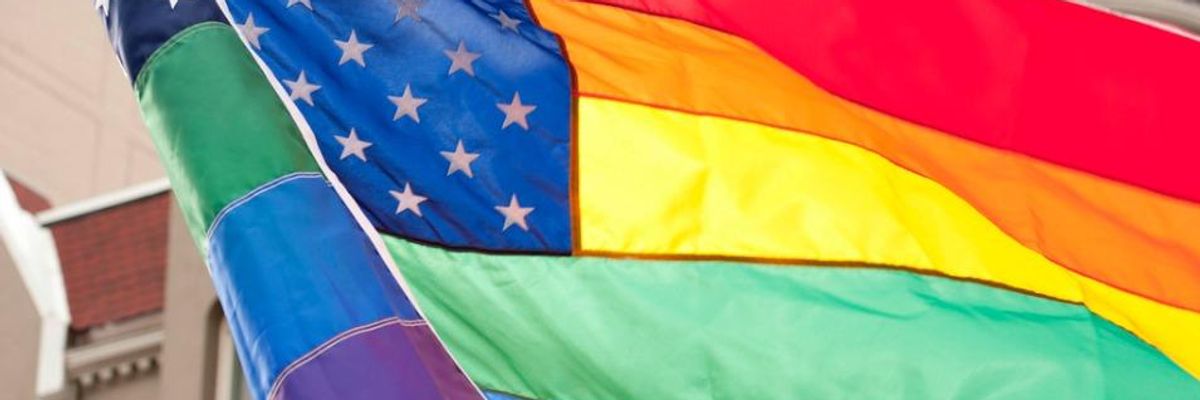I came out late, relative to a lot of my peers. I was almost through college when I finally allowed myself to really consider the other half of the population--women--as potential mates. As soon as I did, my world went from black and white to Technicolor. I remember walking around my college campus, considering the women around me with new eyes. I was on fire, finally feeling the stirrings of intense attraction I'd only read about.
I take so much pride and joy in being queer. I love the freedom it affords me, to make my own meaning out of relationships, to create my own ideals of attraction, to build community through a shared experience of difference and discovery. But, like so many of my peers in their 20s and 30s, marriage has never been my fight. I talked to my mom the day after the Supreme Court legalized same-sex marriage in every state. She recounted telling her sister, who was elated about the decision, that I'm just not that into marriage. It's true. It's not even a personal thing--I may very well get married some day. But marriage has never my entry point into activism, and I've always related to it with the equivalent of political side eye. I've never believed that true social justice would be achieved through access to an institution that was fraught with sexist, classist and racist history.
And still, last Friday was an emotional day. It's not lost on me, the symbolism of this shift, and the very real differences this will make in the lives of many who are seeking the benefits that marriage offers. I got the most emotional when I saw a picture of a dear friend, her face red and tear-streaked, as she talked to her young daughter about how she and her partner's wedding this coming weekend would now be recognized across the nation.
Amidst all of the celebration, those of us in what we might call the left flank of the LGBT movement posted cautionary celebratory messages all over social media. "Yes, this matters," we posted. "Yes many have fought for this," we tweeted. "But this isn't enough," we cautioned. "There is so much more to do," we warned. "Where will all the money go?" we asked.
For decades marriage has been the focus of Gay Inc., the non-profit industrial complex that has led the charge for gay marriage, while also giving nods to issues like discrimination, transgender rights and immigration. But the marriage fight has always been front and center, a perpetual requirement.
Here we are: the moment where our political attention is no longer trained on rainbow wedding cakes. I think the question of where the movement goes next may be more important than this historic turning point.
I'm fearful.
Since 2013, when the Defense of Marriage Act was overturned, we've been hearing the grumblings of divestment and funding limitations. I'm afraid that all of the energy, all of the fight, all of the money that has been invested in winning this singular battle will dry up.
Gay people, especially rich gay ones, have had a lot invested in this marriage fight. They've literally been fighting to protect their inheritances, their properties, their tax benefits. Now that they've won, will they continue to be invested in struggles that are less their own?
A movement is defined by a shared goal, a common experience and often a shared marginalization. This step forward widens the already large splinter in the LGBT movement, a splinter that mimics the broader ones we see in society at large. Will our shared differences, our non-normative sexualities and sometimes genders, be enough to keep us together through the race and class divides that separate us?
There is no denying that gay marriage is a giant leap forward in social and legal recognition--at least for monogamous, two-partner, long-term relationships--but it also means that LGBT people's experience of shared marginalization may weaken. There are many in the community whose only real barrier to true equality was marriage. The only thing preventing them from enjoying full access to wealth, mobility and political clout was the inability to officially and fully join this institution. For many gays and lesbians, their lives are no longer on the margins--especially for those who are gender-conforming, white, and middle or upper class.
But for those of us who are queer, gender non-conforming, immigrants, people of color, poor, interested in family formation outside of a two partner marriage--marginalization and alienation remain, and may even intensify as a new cadre is ushered into the expanding institution of marriage that Justice Kennedy outlined in his decision.
No moment illustrated this marginalization more powerfully than when Jennicet Gutierrez, a transgender Latina immigrant, talked back to President Obama at the White House Pride Celebration earlier this week. Her protest was met with reported boos from the audience, and a strong take-down from the President himself. In a moment of true access to power, most of the gathered LGBT movement leaders chose to participate in silencing one of the most marginalized members, rather than sit with the discomfort of pushing back on a President who has been an ally in some ways, and an enemy in others.
Ours is a society with growing inequities, a widening gap between rich and poor, black and white, documented and undocumented. Gay marriage is unlikely to do much to narrow this gap. We all stand to benefit from access to marriage, if we choose to access those benefits. But how much we benefit, and how much those benefits outweigh the challenges we face depends a lot on our proximity to privilege and power. A big part of our community just took a giant step closer to that center of privilege and power. My only hope is they use that proximity to make room for the rest of us.

